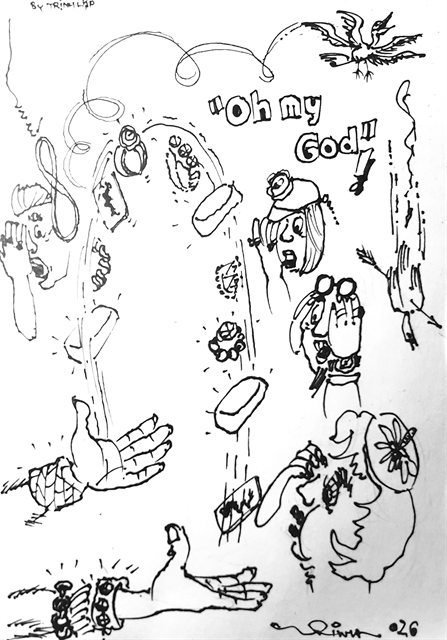 Talk Around Town
Talk Around Town

 |
| Illustration by Trịnh Lập |
by Nguyễn Mỹ Hà
Lunar New Year is coming fast, and peach blossom branches and trees have been put up around Hà Nội. Never before have peach and kumquat gardeners in the city been so proud of their diverse styles and types of pink blossoms, the signature detail of every family living in the north of the country.
As we drove along the narrow chessboard of roads in the new peach farms off the Red River, our jaws dropped as we saw so many trees in full bloom.
If the flowers bloom now, growers cannot sell them for Tết [Lunar New Year festival, which falls on January 22 this year], which means the whole year's work of watering, pruning, and leaf picking shall go wasted.
The peach growers originally had their gardens in Nhật Tân Village, located between the West Lake and the Red River, but have moved all their gardens off the dykes to be closer to the river, which provides more fertile soil than the old land. The flowers, therefore, have become much bigger than our memory from childhood when we walked the Hàng Lược flower market with our parents.
During those days, the land for peach tree growing was limited, and the types of flowers were few, only bright and pale pink colours. And the art of making peach blossoms for Tết was one of the most guarded secrets, which only some elders of Nhật Tân village possessed.
We fondly recall an experience when we bought a beautiful peach branch with blooms, only to find out later that all the little blossoms were placed on a tiny wire on the branch. Needless to say, we were disappointed and felt cheated at the time. But now, looking back, I wonder how they could think of such a brilliant little trick to make their otherwise discarded products suitable for sale!
Today, no one would think of such a trick, let alone do it. Because the fertile soil by the Red River provides the biggest and most beautiful blossoms of peach flowers, which sometimes resemble rare roses.
Growers rent the thin strips of land along the river, some put up a sign with their phone numbers in case visitors want to buy some. But they all know each other, so if you're standing on a growers' land but set your eyes on a more beautiful branch in bloom in the row next door, they can call the owner for you.
The peach flower trees need to start blooming a few weeks before Tết. The plastic Christmas trees have been removed to be replaced by the peach, grapefruit or kumquat trees to usher in a new prosperous Lunar New Year, the Year of the Cat in Việt Nam or of the Rabbit in other east Asian countries this year.
Growers now plant very small-sized branches, enough to place on a family's small altar. An average-sized branch for a mid-size home costs between VNĐ200,000 - 400,000. A bigger branch with a winding and rising top, resembling a rising dragon, can cost from VNĐ1 million and up. They usually get to decorate cafes and restaurants for everyone to see. Public offices and corporate halls need full trees with roots to last through the holiday.
This week's weather forecast predicts a warmer time ahead, which is good news for the villagers. When we spotted a fine-shaped branch that we wanted to buy, the owner insisted that we come back in 10 days so that the buds can grow bigger, and only then will they bloom after cutting.
As time changed, people who once cared about only their flower products now worry about their customers' satisfaction; they have come a long way from trying to gain a few bucks by tricking buyers with cheap tricks.
When we sat at a tea stall in the corner of a garden, a beautiful white daisy pot bloomed radiantly on a plain wooden table.
"Can you sell us the flowers?" we asked, but the tea seller flatly refused. "No, I cut them this morning and have put them here for everyone to see and enjoy. Not for sale."
These terms also recalled a distant past when big empty department stores by Hà Nội's Hoàn Kiếm Lake carried a small written notice on their items that said: "For display only, Not for sale!" Those were days of economic hardship.
Today's "Not for Sale" sign, for flowers, is now one symbol of community service, which shows us a lot about the slow growth of an ever-changing society. VNS




